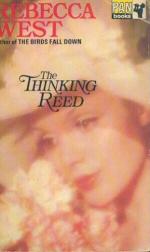|
This section contains 229 words (approx. 1 page at 300 words per page) |

|
The novel is narrated by an omniscient, third-person narrator. West uses this technique for two reasons. One, she is able to use Isabelle as an instrument to critique European society, and, two, by creating narrative distance with Isabelle, West can also more forcefully point to the complexities in Isabelle's character. Thus West gains more with a third person narrator than with a first person narrator such as Jenny in The Return of the Soldier. West also uses the "off-stage" voice of Isabelle's Uncle Honore, who communicates from America with Isabelle in Paris about financial matters. His letters to Isabelle provide a common sense, American counterpoint to the instability and turmoil of Isabelle's public and private worlds. West found Americans honestly straightforward when she visited America in the 1920s; certainly Uncle Honore (and to an extent Isabelle) is modeled on her perceptions of Americans.
Again The Thinking Reed, like...
|
This section contains 229 words (approx. 1 page at 300 words per page) |

|




